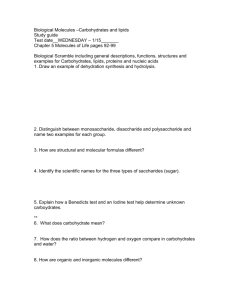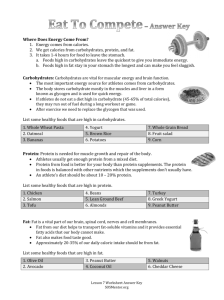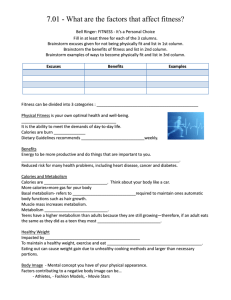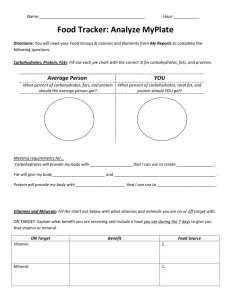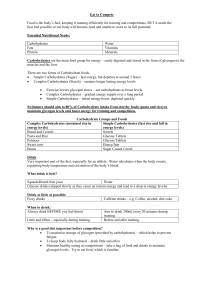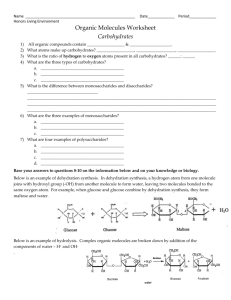The Perfect Training Diet for Soccer Players
advertisement
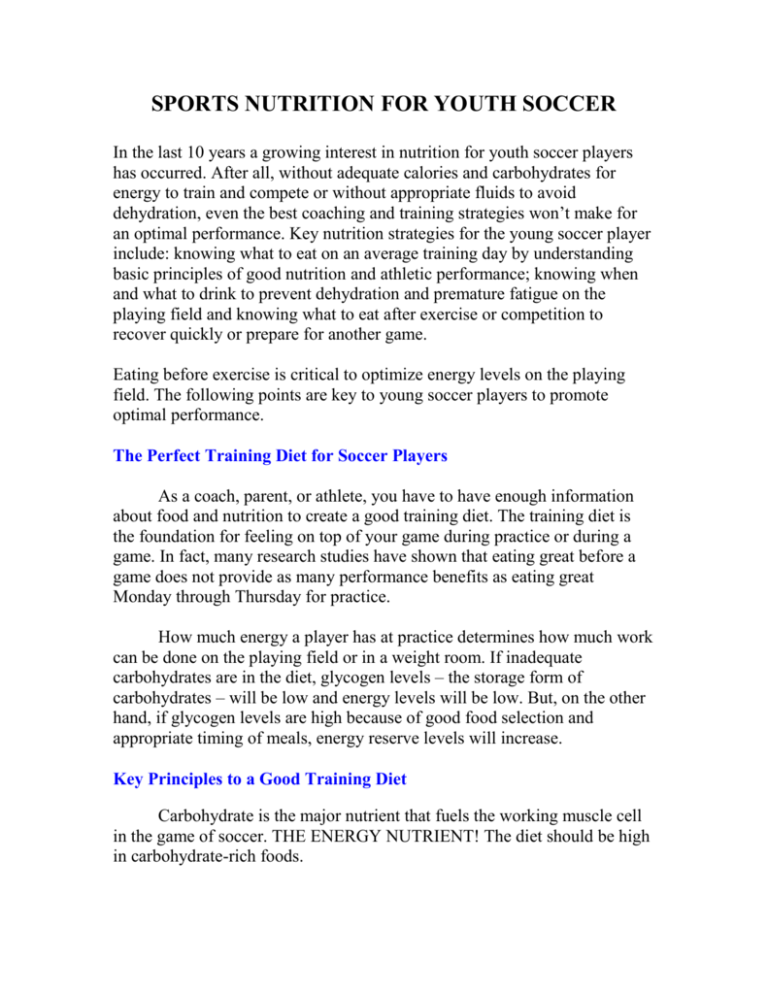
SPORTS NUTRITION FOR YOUTH SOCCER In the last 10 years a growing interest in nutrition for youth soccer players has occurred. After all, without adequate calories and carbohydrates for energy to train and compete or without appropriate fluids to avoid dehydration, even the best coaching and training strategies won’t make for an optimal performance. Key nutrition strategies for the young soccer player include: knowing what to eat on an average training day by understanding basic principles of good nutrition and athletic performance; knowing when and what to drink to prevent dehydration and premature fatigue on the playing field and knowing what to eat after exercise or competition to recover quickly or prepare for another game. Eating before exercise is critical to optimize energy levels on the playing field. The following points are key to young soccer players to promote optimal performance. The Perfect Training Diet for Soccer Players As a coach, parent, or athlete, you have to have enough information about food and nutrition to create a good training diet. The training diet is the foundation for feeling on top of your game during practice or during a game. In fact, many research studies have shown that eating great before a game does not provide as many performance benefits as eating great Monday through Thursday for practice. How much energy a player has at practice determines how much work can be done on the playing field or in a weight room. If inadequate carbohydrates are in the diet, glycogen levels – the storage form of carbohydrates – will be low and energy levels will be low. But, on the other hand, if glycogen levels are high because of good food selection and appropriate timing of meals, energy reserve levels will increase. Key Principles to a Good Training Diet Carbohydrate is the major nutrient that fuels the working muscle cell in the game of soccer. THE ENERGY NUTRIENT! The diet should be high in carbohydrate-rich foods. Protein is THE HEALING AND RECOVERY NUTRIENT! Although important for growth, formation of red blood cells, and hormones, protein is not the key energy nutrient. The diet should include a moderate amount of protein rich foods. Fat is the second ENERGY NUTRIENT. The muscle cell uses fat as a secondary energy source. The diet should be moderately low in fat. What Should You Eat Before Working Out? The two key nutrients important before exercise are water and carbohydrates. Examples of carbohydrates-rich foods that can be easily eater as an early morning, mid-morning, afternoon, or early evening pre-exercise meal include: Eating carbohydrate-rich foods prior to exercise will: 1. Raise blood sugar 2. Protect glycogen stores 3. Provide an immediate form of easy, accessible fuel Without carbohydrate prior to workouts: 1. Lower blood sugar (hypoglycemia) would cause early onset fatigue during training or competition 2. You begin to breakdown important body tissues, such as muscle, instead of building it up Morning meal ideas or anytime snacks 2 pieces of toast with jelly or honey (30 grams carbohydrates) 1 bagel with jelly or honey (32 grams of carbohydrates) 1 chocolate granola bar (20 grams carbohydrates) 1 cup oatmeal, ½ cup skim milk (20 grams carbohydrates) 2 cups cold cereal, 1 cup skim milk (44 gram carbohydrates) 1 cup orange juice (26 gram carbohydrates) 1 cup applesauce (60 gram carbohydrates) 1 medium banana (26 gram carbohydrates) 1 cup cooked rice mixed with 1 cup vanilla yogurt (36 grams carbohydrates) Afternoon meal model or anytime snacks Sandwich with high protein filling (meat, cheese, fish, egg salad) Salad, fruit or vegetable Cooked vegetables (broccoli, carrots, etc.) one piece of fruit Beverage: milk (soy or regular), juice, sports drink Evening meal model or anytime snacks Chicken, turkey, beef, fish – 4-6 oz (size of the palm of an adult’s hand) 2-3 cups of a high carbohydrate food / starchy food (rice, pasta, potatoes, corn, peas), can also include breads and cereals Vegetables (2 cups), Fruit (2 pieces), and Milk (1-2 cups) or Juice (1-2 cups) Eating After Exercise Although much emphasis gets placed on eating before exercise for energy, what is eaten after exercise determines how quickly the young athlete recovers and is able to perform either the next day or during a consecutive game. The rules of thumb regarding recovery nutrition and soccer focus on two leading nutrients: carbohydrates and protein. First, carbohydrate-rich foods eating within the first two hours after intense physical activity restore glycogen, the body’s storage form of carbohydrate. Glycogen is the name of the carbohydrate used during soccer and can only become a fuel source if the athlete eats adequate amounts of carbohydrate-containing foods (rice, pasta, cereals, bread, fruits, juice, sport drinks are some examples). During exercise, glycogen is broken down to its smaller carbohydrate component, glucose, to be used as energy. Hundreds of calories worth of glycogen get used in one game of soccer and consequently must be replaced at the end of the day. Simply eating carbohydrate-rich foods will do the trick! But, what appears to be important is the timing of eating these foods. For example, eating carbohydrate foods within the first two hours after exercise stimulates glycogen formation at a quick pace. Once the two-hour “window of opportunity” is over, glycogen will still be formed, only at a slower pace. Researchers have demonstrated that glycogen replacement in athletes who have depleted their stores can take up to 20 hours. This means that there is usually no time to lose. Having bagels, pretzels, sports drinks, fruits, snack bars/candy bars with peanuts, sandwiches, and juices available after a game or in a locker room will certainly allow athletes to start eating and drinking carbohydrates immediately. The second nutrient to pay attention to after exercise is protein. Although most foods groups contain varying amounts of protein, the two groups containing the most are the meat or meat alternative group and the dairy products group. Studies have shown that specific amino acids can counter protein breakdown after intense physical activity. Foods from both the meat and dairy groups contain all of the essential amino acids, making them excellent choices to promote. For example, yogurt, milk, cheese, and ice cream provide protein as well as carbohydrates to promote glycogen formation. On the other hand, turkey or beef burgers, a tuna fish or peanut butter sandwich, or a cup or tow or peanut and sunflower-rich trail mix will boost protein. By eating adequate protein after exercise young soccer players give themselves an advantage in two ways. First, they’re eating appropriate nutrients (amino acids) to help repair the wear and tear on their muscle cells and secondly, they’re eating the nutrient that will promote growth of muscle cells. The combination of carbohydrate and protein after exercise is the key formula for optimal recovery along with adequate fluid. Fluids and Their Importance The archenemy of any athlete is dehydration. At a level of only 1-2% dehydration, a young soccer player will start to feel prematurely tired or fatigued. This could occur after playing for only 15 minutes under intense sun or within 30 minutes of normal weather conditions depending on how much fluid has been consumed prior to playing. Whether an athlete prefers water or sport drinks, both are the solution to dehydration. To help an athlete understand the critical aspect of fluid needs, discussing the role water plays in energy metabolism can be helpful. Each exercising muscle cell uses water as part of the process of breaking down energy nutrients such as carbohydrate and fat. As exercise becomes prolonged, more energy is needed to fuel activity. In addition, as sweating occurs to cool the body during activity, more water is lost. If fluid is not replaced, the body’s ability to sweat is decreased and the body’s internal core temperature increases. In the extreme case, heat stroke can occur due to an excessively high internal core temperature. There are many degrees or stages of dehydration before this, but the bottom line is that no degree of dehydration is good. Preventing dehydration can be simple as long as the soccer player will drink as frequently as possible during a game and go into the game well hydrated. Water, in and of itself, is a nutrient. It provides no calories or energy, but it can adequately hydrate an athlete both before and during play. However, excellent studies have shown athletes that don’t drink adequate volume of water alone. Since taste appears to influence the amount or volume of fluid consumed at any given time, sport drinks that come in a wide variety of flavors and colors appear to stimulate thirst and consequently volume consumed. The fact that sport drinks contain a small percentage of carbohydrates, sodium, and potassium almost make them a superior fluid to water. However, water, in many cases, can be an adequate hydration beverage. If a young soccer play appears to sweat profusely, losing noticeable body water, a sport drink may be the better choice in preventing dehydration. It is strongly recommended that both sport drinks and water are made available to young athletes and that the coach encourages frequent drinking, beyond the level of basic thirst. Recommendations for drinking before, during, and after a game of soccer are as follows: Before a game, drink 16 oz. Or 2 cups of fluid one hour prior to playing During a game, make an effort to drink 4-6 oz. or ½ cup of fluid every 1520 minutes of play time After a game, drink immediately and often until urine color is very light yellow to clear Encourage athletes to carry water bottles and start hydrating in preparation for a game the night before. According to some studies, urine color can be related to hydration and this may be a good way to help younger athletes pay attention to how much they’ve had to drink. Supplements Because appetites can become suppressed during competitive seasons, supplemental calories may help prevent unnecessary weight loss. Players must understand that a protein or carbohydrate powdered supplement is simply calories that they can DRINK instead of EAT. They’re the same calories found in food, but might, for some players be easier to consume. There’s nothing magical about liquid supplement calories. In fact, the soccer players I’ve worked with had very little success in maintaining their playing weight with the help of supplements alone. Supplements can’t take the place of meals. They’re meant to be eaten IN ADDITION to meals, to provide extra calories during the day that can’t be added at mealtime either due to lack of appetite, exhaustion, or because of fullness. Good choices in supplements are powders that can be easily mixed with milk or juice (rich sources of extra calories themselves). Chocolate appears to be a popular flavor and many of these carbohydrate-protein powders taste acceptable. Look for a supplement that will contribute approximately 600-1000 calories. Your target calorie goal is an extra 1000 calories per day. Although some are costly, sport bars and sport drinks are fairly convenient to buy, and consume. Some sport bars contain excellent sources of protein and carbohydrate and contribute 300-500 calories per bar. Sport drinks contribute carbohydrates, the best source of energy, along with water for hydration. Studies show that athletes will drink more volume of fluid if the beverage tastes good. Candy bars containing peanuts are also good sources of protein and carbohydrates. Powdered supplements can be added to milkshakes for a protein and carbohydrate boost, although they are expensive. In addition to extra calories to maintain weight during a competitive season, soccer players may benefit from taking a multiple vitamin-mineral supplement. Since calorie consumption may not be perfect and food selection irregular, a vitamin-mineral supplement could help players meet daily needs. Since a basic vitamin and mineral supplement doesn’t provide calories, players need to understand that again, this merely supplements their diet. Food selection should be important as their primary source of nutrients. Vitamins and minerals do not provide energy. Carbohydrates, Proteins and Fats are the energy nutrients. But, vitamins and minerals play key roles in helping the body break down carbohydrates, proteins and fats for energy and build other body structures. This article has focused on the role an optimal diet can have on athletic performance for youth soccer players. The most important aspect of this article was the role of carbohydrates in promoting high levels of energy, and fluids for decreasing dehydration. Encourage your athletes to care about their food selection and reap the benefits of good nutrition. They may become a better soccer player than they ever expected! Kristine Clark, Ph.D. R.D. Director of Sports Nutrition for Sports Medicine, The Pennsylvania State University
